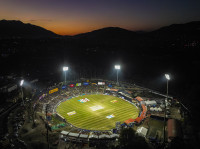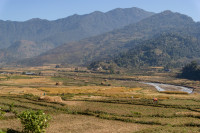Opinion
Moment of reckoning
Political parties are not particularly known for their wisdom of moderation and mediation
Khagendra N. Sharma
The new constitution is said to have been enforced, but it is a half-truth. In fact, the constitution is not even a complete document. It says Nepal is a “federal democratic republic”, but where is the “federal” structure? Seven regions have been demarcated as federal provinces, but after the endorsement of the constitution, the whole country was held hostage by agitating forces. The government responded by partially amending the constitution, which was rejected by the protesting groups.
The first thing to do to implement the constitution is to settle the dispute through dialogue and negotiation. The government claims that the amendment has settled all major issues. But the revolting Madhesi Morcha does not agree. The process of dialogue seems to have been suspended after PM Oli’s Delhi visit. Seriousness is required from both the sides.
Set of pre-requisites
A complete checklist of things to do for the full implementation of the constitution should have been prepared in the very first week or at least the first month of its promulgation. But no care seems to have been given in this regard. Let’s start with the time frame. Roughly, two and a quarter years were left for current Parliament to complete the state restructuring process and conduct elections for next Parliament. More than half a year has passed, but no action has been initiated. If the restructuring is not completed by that date, there will be a constitutional crisis. Parliament cannot extend its tenure. The Cabinet cannot survive without the support of Parliament. The country will be left in the hands of the President and the Vice President. Is this what the present government wants?
Another pre-requisite is the passage of over a hundred new laws or the amendment of old laws regarding the restructuring from a unitary state to a federal one. This requires not only a seriousness of purpose, which is lacking, but also a considerable stretch of time for Parliament and the various committees. Many acts of restructuring cannot even begin without the presence of the concerned laws and by laws. The government has formed a committee under the leadership of the PM to direct the course of the implementation of the constitution. But in this lone act too, two oversights have been noted. First, the Nepali Congress (NC) was not consulted and second, the minister of Local Development and Federal Affairs was excluded from the said committee. Such flawed approaches are the result of a lack of foresight in the leadership.
Future hurdles
One urgent pre-condition is the identification of the provincial or state capital for each of the seven or more provinces finally agreed upon by all the political forces. Identification of the capital can be a thorny issue in itself. The power of determining the provincial capital seems to have been vested in the state legislature, which cannot be formed in the foreseeable future. But as several regions, populated by diverse communities, are involved, each community would exert pressure to locate the capital in the area where they have greater presence, leading to disputes. The political parties are not particularly known for their wisdom of moderation and mediation. So a cold war will surface, requiring the highest level of intervention.
After selecting the capitals, other problems—such as building of infrastructures including access to road networks, supply of drinking water, electric lines, projects to construct buildings to house the legislature, the cabinet and the high court, innumerable state level government offices and residences for important functionaries—will arise. Given the record of the speed of construction works in Nepal in the public sector, such massive construction programmes cannot be completed in a decade even if resources are made available within a reasonable time frame. All these construction works will need budgetary resources far beyond the capability of the government. So we might need to borrow money for this purpose, but the necessary preparedness is not visible in any corner.
The opposition
The process of federalisation has proven to be a problem that the political parties have failed to cope with. The NC claims to actively engage in the process of implementation, but it has opted to stay in the opposition. If it seriously intends to engage in the implementation, it should be willing to help the government. But it is claiming to play the role of ‘constructive opposition’, whatever that is intended to connote. In the general political parlance, an opposition is an ideological position which tries to keep the government in track. The obvious goal of the opposition party, however, is to drive away the government with the motive to replace it. So the rhetoric of offering constructive opposition is an ornamental coating to conceal the real motive.
The constitution has been brought to the present state by the collective effort of the NC, the CPN-UML, the UCPN (Maoist) and some smaller parties. It is the moral responsibility of the big parties, particularly the NC, to continue collaboration, and finalise and implement the constitution. This responsibility cannot be accomplished by playing the role of the opposition. It is an urgent necessity to bring the federal republic into existence, for both the establishment and the opposition to play their respective roles. Both of them should realise that Nepal is still undergoing a dark transition. If the republic fails, the opposition will have no one but itself to oppose!
Sharma is a political analyst. He can be contacted at [email protected]




 13.12°C Kathmandu
13.12°C Kathmandu










